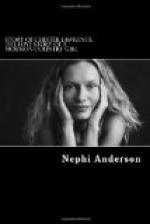The minister closed his eyes, but he did not go to sleep. His mind was too active for that, his nerves were tingling again. The bright, gay life about him did not exist for him. That afternoon he lived in the past. He marshalled for review contending thoughts, that had for many years fought for supremacy. Out of the chaos of conflict no order had yet come. He was getting old before his years justified it.
Why should he, a minister of the word of God, be so easily moved by strange religious ideas? Faintly as if from some distant, mostly forgotten past, there came to him this idea, that the truth, the whole, clean, simple truth as it exists in Christ Jesus had been told him, and he had rejected it. Why he had done this was not clear to him. He seemed to have lived in periods of alternating darkness and light. Then later, he had come in contact with so-called “Mormonism.” Strange to say, its teachings had the same ring as that which he had heard before; but this time he rejected it because of its evil name. Once again, a little later, these same doctrines had come to him, but they were not welcomed when he learned that those who taught them and lived them were simple, ofttimes uneducated people, usually called the “scum” of the earth.
The Rev. Mr. Strong had actually given up his pastorship in two places, moving westward until he reached Kansas City.—Here for a number of years, he had experienced peace, a sort of indifferent peace, he admitted, due more to callousness of soul than to anything else. Then came Lucy’s adventure with the “Mormon” elders on the streets, and her visit to “Mormon” meetings. She had brought “Mormon” literature home, and he had read it, read it all. He had asked her to bring more. He had often sat up till midnight to finish a book, then had railed at Lucy for bringing it into the house. And now the conflict was on again, harder than ever. He closed his eyes, saying, “No, no;” then opened them again to the beautiful light. He stopped his ears, crying, “I will not hear;” then listened to the sweet music. With all the force of his life’s training, he railed against the doctrine; then in silence contemplated its glorious truths. He drove the thought of it out of his mind; then welcomed it eagerly back. Back and forth, in and out, in doubt and fear, in faith and hope his soul had suffered and wrought.
What was the outcome to be? Evidently, the end was not yet; for had he not purposely taken this trip abroad, to get away from some of these things, and had he not run hard against that which he had hoped to escape. And in what form had it now come? In that of his son, his only son, the child of his younger days! Surely God was in this thing. “Yes,” the man muttered, “God is watching me. I cannot escape. His hand is over me. ’If I take the wings of the morning and dwell in the uttermost parts of the sea; even there shall thy hand lead me, and thy right hand shall hold me!’”




